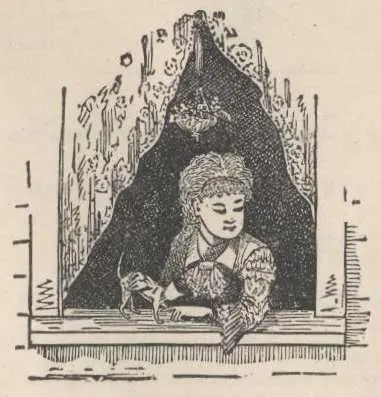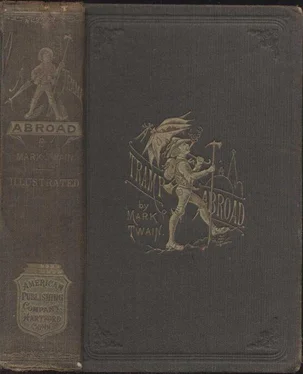Mark Twain - A Tramp Abroad
Здесь есть возможность читать онлайн «Mark Twain - A Tramp Abroad» весь текст электронной книги совершенно бесплатно (целиком полную версию без сокращений). В некоторых случаях можно слушать аудио, скачать через торрент в формате fb2 и присутствует краткое содержание. Жанр: Классическая проза, Юмористическая проза, на английском языке. Описание произведения, (предисловие) а так же отзывы посетителей доступны на портале библиотеки ЛибКат.
- Название:A Tramp Abroad
- Автор:
- Жанр:
- Год:неизвестен
- ISBN:нет данных
- Рейтинг книги:5 / 5. Голосов: 1
-
Избранное:Добавить в избранное
- Отзывы:
-
Ваша оценка:
- 100
- 1
- 2
- 3
- 4
- 5
A Tramp Abroad: краткое содержание, описание и аннотация
Предлагаем к чтению аннотацию, описание, краткое содержание или предисловие (зависит от того, что написал сам автор книги «A Tramp Abroad»). Если вы не нашли необходимую информацию о книге — напишите в комментариях, мы постараемся отыскать её.
A Tramp Abroad — читать онлайн бесплатно полную книгу (весь текст) целиком
Ниже представлен текст книги, разбитый по страницам. Система сохранения места последней прочитанной страницы, позволяет с удобством читать онлайн бесплатно книгу «A Tramp Abroad», без необходимости каждый раз заново искать на чём Вы остановились. Поставьте закладку, и сможете в любой момент перейти на страницу, на которой закончили чтение.
Интервал:
Закладка:

I saw that dandy's curious game played afterward, in Paris, but not for amusement; not with a motive of any sort, indeed, but simply from a selfish indifference to other people's comfort and rights. One does not see it as frequently in Paris as he might expect to, for there the law says, in effect, "It is the business of the weak to get out of the way of the strong." We fine a cabman if he runs over a citizen; Paris fines the citizen for being run over. At least so everybody says—but I saw something which caused me to doubt; I saw a horseman run over an old woman one day—the police arrested him and took him away. That looked as if they meant to punish him.
It will not do for me to find merit in American manners—for are they not the standing butt for the jests of critical and polished Europe? Still, I must venture to claim one little matter of superiority in our manners; a lady may traverse our streets all day, going and coming as she chooses, and she will never be molested by any man; but if a lady, unattended, walks abroad in the streets of London, even at noonday, she will be pretty likely to be accosted and insulted—and not by drunken sailors, but by men who carry the look and wear the dress of gentlemen. It is maintained that these people are not gentlemen, but are a lower sort, disguised as gentlemen. The case of Colonel Valentine Baker obstructs that argument, for a man cannot become an officer in the British army except he hold the rank of gentleman. This person, finding himself alone in a railway compartment with an unprotected girl—but it is an atrocious story, and doubtless the reader remembers it well enough. London must have been more or less accustomed to Bakers, and the ways of Bakers, else London would have been offended and excited. Baker was "imprisoned"—in a parlor; and he could not have been more visited, or more overwhelmed with attentions, if he had committed six murders and then—while the gallows was preparing—"got religion"—after the manner of the holy Charles Peace, of saintly memory. Arkansaw—it seems a little indelicate to be trumpeting forth our own superiorities, and comparisons are always odious, but still—Arkansaw would certainly have hanged Baker. I do not say she would have tried him first, but she would have hanged him, anyway.
Even the most degraded woman can walk our streets unmolested, her sex and her weakness being her sufficient protection. She will encounter less polish than she would in the old world, but she will run across enough humanity to make up for it.
The music of a donkey awoke us early in the morning, and we rose up and made ready for a pretty formidable walk—to Italy; but the road was so level that we took the train.. We lost a good deal of time by this, but it was no matter, we were not in a hurry. We were four hours going to Chamb`ery. The Swiss trains go upward of three miles an hour, in places, but they are quite safe.
That aged French town of Chambèry was as quaint and crooked as Heilbronn. A drowsy reposeful quiet reigned in the back streets which made strolling through them very pleasant, barring the almost unbearable heat of the sun. In one of these streets, which was eight feet wide, gracefully curved, and built up with small antiquated houses, I saw three fat hogs lying asleep, and a boy (also asleep) taking care of them.

From queer old-fashioned windows along the curve projected boxes of bright flowers, and over the edge of one of these boxes hung the head and shoulders of a cat—asleep. The five sleeping creatures were the only living things visible in that street. There was not a sound; absolute stillness prevailed. It was Sunday; one is not used to such dreamy Sundays on the continent. In our part of the town it was different that night. A regiment of brown and battered soldiers had arrived home from Algiers, and I judged they got thirsty on the way. They sang and drank till dawn, in the pleasant open air.
We left for Turin at ten the next morning by a railway which was profusely decorated with tunnels. We forgot to take a lantern along, consequently we missed all the scenery. Our compartment was full. A ponderous tow-headed Swiss woman, who put on many fine-lady airs, but was evidently more used to washing linen than wearing it, sat in a corner seat and put her legs across into the opposite one, propping them intermediately with her up-ended valise. In the seat thus pirated, sat two Americans, greatly incommoded by that woman's majestic coffin-clad feet. One of them begged, politely, to remove them. She opened her wide eyes and gave him a stare, but answered nothing. By and by he proferred his request again, with great respectfulness. She said, in good English, and in a deeply offended tone, that she had paid her passage and was not going to be bullied out of her "rights" by ill-bred foreigners, even if she was alone and unprotected.

"But I have rights, also, madam. My ticket entitles me to a seat, but you are occupying half of it."
"I will not talk with you, sir. What right have you to speak to me? I do not know you. One would know you came from a land where there are no gentlemen. No GENTLEMAN would treat a lady as you have treated me."
"I come from a region where a lady would hardly give me the same provocation."
"You have insulted me, sir! You have intimated that I am not a lady—and I hope I am NOT one, after the pattern of your country."
"I beg that you will give yourself no alarm on that head, madam; but at the same time I must insist—always respectfully—that you let me have my seat."
Here the fragile laundress burst into tears and sobs.
"I never was so insulted before! Never, never! It is shameful, it is brutal, it is base, to bully and abuse an unprotected lady who has lost the use of her limbs and cannot put her feet to the floor without agony!"
"Good heavens, madam, why didn't you say that at first! I offer a thousand pardons. And I offer them most sincerely. I did not know—I COULD not know—anything was the matter. You are most welcome to the seat, and would have been from the first if I had only known. I am truly sorry it all happened, I do assure you."
But he couldn't get a word of forgiveness out of her. She simply sobbed and sniffed in a subdued but wholly unappeasable way for two long hours, meantime crowding the man more than ever with her undertaker-furniture and paying no sort of attention to his frequent and humble little efforts to do something for her comfort. Then the train halted at the Italian line and she hopped up and marched out of the car with as firm a leg as any washerwoman of all her tribe! And how sick I was, to see how she had fooled me.

Turin is a very fine city. In the matter of roominess it transcends anything that was ever dreamed of before, I fancy. It sits in the midst of a vast dead-level, and one is obliged to imagine that land may be had for the asking, and no taxes to pay, so lavishly do they use it. The streets are extravagantly wide, the paved squares are prodigious, the houses are huge and handsome, and compacted into uniform blocks that stretch away as straight as an arrow, into the distance. The sidewalks are about as wide as ordinary European STREETS, and are covered over with a double arcade supported on great stone piers or columns. One walks from one end to the other of these spacious streets, under shelter all the time, and all his course is lined with the prettiest of shops and the most inviting dining-houses.
Читать дальшеИнтервал:
Закладка:
Похожие книги на «A Tramp Abroad»
Представляем Вашему вниманию похожие книги на «A Tramp Abroad» списком для выбора. Мы отобрали схожую по названию и смыслу литературу в надежде предоставить читателям больше вариантов отыскать новые, интересные, ещё непрочитанные произведения.
Обсуждение, отзывы о книге «A Tramp Abroad» и просто собственные мнения читателей. Оставьте ваши комментарии, напишите, что Вы думаете о произведении, его смысле или главных героях. Укажите что конкретно понравилось, а что нет, и почему Вы так считаете.












